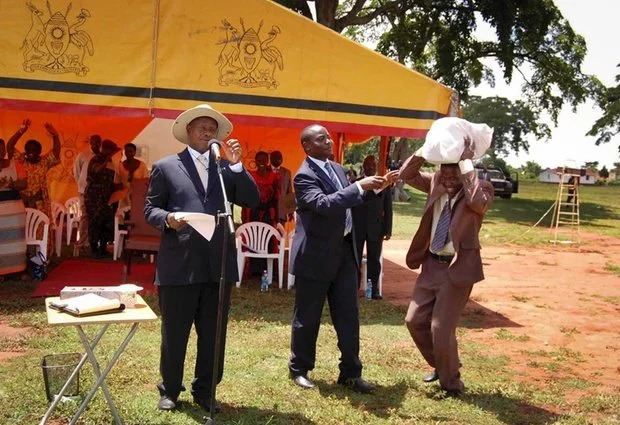By Oweyegha-Afunaduula
Former Vice-President of Uganda, Dr Specioza Kazibwe, said two things that still ring in my head. One was that Ugandans who do not embrace globalisation will be left behind. The other was that the poor will never rule Uganda.
Globalisation does not require the citizens to embrace it. It is beyond their understanding, although the fact is that the Uganda government was the first government in Africa to embrace globalisation. Uganda as a country has been harmed by globalisation far more than she has gained from it.
With respect to the statement that the poor will never rule Uganda, the former Vice-President seems to have correctly predicted what is happening today.
Those who seek to lead put money first and use money – often inappropriately resourced public money or unethical, immoral money – to buy their way to leadership.
Besides poor people, who may be the ones the country needs, are eliminated from accessing leadership positions at the level of nomination. A person seeking to be a Member of Parliament must pay 3 million Shillings on nomination day. A person seeking to be President of Uganda must pay 20 million Shillings on nomination day.
Therefore, in Uganda we do not only have school dropouts or university dropouts. We also have political dropouts.
However, President Tibuhaburwa Museveni, who long ago in Busia said people should come to him because he has all the money, does not feel any financial stress at nomination, during elections, and after elections because all the time he is giving money to individuals and groups of individuals, such as ghetto children, to consolidate his power.
Of course, the money that he gives out is not personal money because he has repeatedly said he gets only 3.8 million Shillings every month as salary. If you want to ask how he gets his money, maybe refer to his cows in Rwakitura and Kisozi or the Parliament of Uganda, which ensures that he is a major factor in the national budget and in every supplementary budget, either as state house or classified expenditure.
During political campaigns, it is no longer a time for people to hear what ideas political candidates have. But it is time to expect to be given money. In the rural areas, politicians do not come to attend burials and “cry” with the bereaved but to show that he or she has money to give out. So, the mourners – the potential voters – do not compare the politicians on the basis of the ideas they have but on how much money they give out.
It is easy to link the declining quality in the people that end up as leaders in Uganda to the money they have and how much they give out. It no longer matters how long one interfaced with a blackboard. Apparently, even the President of Uganda does not emphasize it in the councils and in the Parliament.
We have people in Parliament who are not well exposed in terms of education and ideas and who are not friendly with readings. However, they are well endowed with money. They do not really meaningfully participate in parliamentary proceedings but only wait for the next round of political campaigns either to dance before their constituents or dish out money to them or both.
Therefore, what former Vice-President Specioza Wandira Kazibwe predicted has come to pass in the 21st century. Politics has become both an industry and the most lucrative employer, but the employees are more poor quality and financially empowered. When they are elected, the first thing they emphasize is filling their pockets with money.
They do not add value to the quality of legislation – something they leave to only a handful of Members of Parliament. The Cabinet is full of them too. Of the 83 Cabinet Members, only a handful of them are heard of. The rest are just consuming public money.
As I have always said, behind every problem is the problem of leadership. Although President Tibuhaburwa Museveni once said, “The problem of Africa is leaders who overstay in power,” in Uganda the problem of the country is leaders “who are leaders” because of money, not brains with ideas.
For God and My Country.



